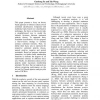COLING
2010
13 years 6 months ago
2010
Given the increasing need to process massive amounts of textual data, efficiency of NLP tools is becoming a pressing concern. Parsers based on lexicalised grammar formalisms, such...
COLING
2010
13 years 6 months ago
2010
Precision-oriented search results such as those typically returned by the major search engines are vulnerable to issues of polysemy. When the same term refers to different things,...
COLING
2010
13 years 6 months ago
2010
This paper presents a novel semisupervised learning algorithm called Active Deep Networks (ADN), to address the semi-supervised sentiment classification problem with active learni...
COLING
2010
13 years 6 months ago
2010
We present a transformation scheme that mediates between description logics (DL) or RDF-encoded ontologies and type hierarchies in feature logics (FL). The DL-to-FL direction is i...
COLING
2010
13 years 6 months ago
2010
State-of-the-art approaches for unsupervised keyphrase extraction are typically evaluated on a single dataset with a single parameter setting. Consequently, it is unclear how effe...
COLING
2010
13 years 6 months ago
2010
This paper presents a fuzzy set theory based approach to Chinese sentence-level sentiment classification. Compared with traditional topic-based text classification techniques, the...
COLING
2010
13 years 6 months ago
2010
A new approach has been developed for acquiring bilingual web pages from the result pages of search engines, which is composed of two challenging tasks. The first task is to detec...
COLING
2010
13 years 6 months ago
2010
We show that unsupervised part of speech tagging performance can be significantly improved using likely substitutes for target words given by a statistical language model. We choo...
COLING
2010
13 years 6 months ago
2010
Texts are replete with gaps, information omitted since authors assume a certain amount of background knowledge. We define the process of enrichment that fills these gaps. We descr...
COLING
2010
13 years 6 months ago
2010
We describe a Chinese temporal annotation experiment that produced a sizable data set for the TempEval-2 evaluation campaign. We show that while we have achieved high inter-annota...

